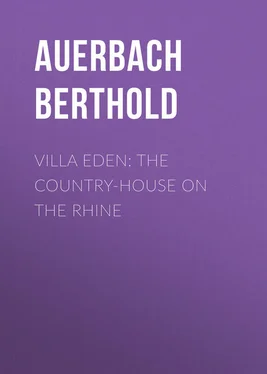Berthold Auerbach - Villa Eden - The Country-House on the Rhine
Здесь есть возможность читать онлайн «Berthold Auerbach - Villa Eden - The Country-House on the Rhine» — ознакомительный отрывок электронной книги совершенно бесплатно, а после прочтения отрывка купить полную версию. В некоторых случаях можно слушать аудио, скачать через торрент в формате fb2 и присутствует краткое содержание. Жанр: foreign_antique, foreign_prose, Историческая проза, на английском языке. Описание произведения, (предисловие) а так же отзывы посетителей доступны на портале библиотеки ЛибКат.
- Название:Villa Eden: The Country-House on the Rhine
- Автор:
- Жанр:
- Год:неизвестен
- ISBN:нет данных
- Рейтинг книги:4 / 5. Голосов: 1
-
Избранное:Добавить в избранное
- Отзывы:
-
Ваша оценка:
- 80
- 1
- 2
- 3
- 4
- 5
Villa Eden: The Country-House on the Rhine: краткое содержание, описание и аннотация
Предлагаем к чтению аннотацию, описание, краткое содержание или предисловие (зависит от того, что написал сам автор книги «Villa Eden: The Country-House on the Rhine»). Если вы не нашли необходимую информацию о книге — напишите в комментариях, мы постараемся отыскать её.
Villa Eden: The Country-House on the Rhine — читать онлайн ознакомительный отрывок
Ниже представлен текст книги, разбитый по страницам. Система сохранения места последней прочитанной страницы, позволяет с удобством читать онлайн бесплатно книгу «Villa Eden: The Country-House on the Rhine», без необходимости каждый раз заново искать на чём Вы остановились. Поставьте закладку, и сможете в любой момент перейти на страницу, на которой закончили чтение.
Интервал:
Закладка:
In the meanwhile, the conduct of Bella gave the lie to the malicious report that she hoped soon to be a rich young widow. Clodwig had had an attack of vertigo shortly before the wedding; and always after that Bella contrived that he should be, without his knowledge, attended by a servant. She devoted herself with the most affectionate care to the old gentleman, who now seemed to enjoy a new life, and to gain fresh vigor on returning to his paternal estate. At the baths, where they went every summer, Clodwig and Bella were highly esteemed personages. She was admired not only for her beauty, but also for her stainless fidelity, and for her solicitous attention to her aged husband.
CHAPTER VI.
THE RECEPTION DAY
It was yet bright daylight here upon the mountain-height, when they approached the Wolfsgarten mansion. As they were making the last ascent through the park, a beautiful girl in a figured blue summer-suit stood in the path between the green trees. Getting sight of the carriage, she quickly turned back again. Two light-blue ribbons, tied behind, according to the fashion, floated in the evening wind. Her step was firm and yet graceful.
"Ah," said Pranken, "to-day we have hit upon my sister's collation-day. That pretty girl who turned about so quickly is the daughter of the Justice, freshly baked out of the oven of the convent of the 'Sacred Heart' at Aix. You will find her a genuine child of the Rhine, and my sister has given her the appropriate name Musselina; there is in her something of perpetual summer. Through this warm-hearted child we are now already announced to the company."
While he was arranging his hair with his pocket-comb, he continued, —
"The family is very respectable and highly esteemed; the little one is too good to be trifled with; one must have an inferior kind to smoke in the open air."
Pranken suddenly became aware whom he was talking to, and immediately added, – "So would our comrade, Don John Nipper, who was everlastingly betting, express himself. Do you know that the wild fellow has now an affection of the spine, and is wheeled about at Wiesbaden in a chair?"
Pranken's whole manner changed; and springing with joyful elasticity out of the carriage, he reached out his hand to Eric, saying, "Welcome to Wolfsgarten!" Many carriages were standing in the court-yard, and in the garden they found the ladies, who with fans and parasols sat upon handsome chairs around a bed of luxuriantly-growing forget-me-nots, in the centre of which was a red rhododendron in full bloom.
"We are no peace-breakers; don't let us disturb you, good ladies," cried out Pranken from a distance, in a jesting tone. Bella greeted her brother, and then Eric, whom she recognised at once. The wife of the Justice and Fräulein Lina were very happy to renew the acquaintance of yesterday; then were introduced the district physician's wife and sister, the head-forester's wife and her mother, the apothecary's wife, the burgomaster's wife, the school-director's wife, and the wives of the two manufacturers. In fact, all the notabilities of the place seemed to have assembled. The gentlemen had gone, it was said, to view some prospect not very far off, and would soon be back.
The conversation was not very lively, and Eric's appearance awakened interest. The director's wife, a large striking figure – Bella called her the lay figure, for she knew how to dress well, and everything became her – raised her opera-glass and looked round upon the landscape, but took advantage of this survey to get a nearer look at Eric's face. The manner in which she then balanced the glass in her hand seemed to say that she was not altogether displeased with the view.
After the first question, how long it was since Eric had seen the Rhine, and after he had informed them how everything had appeared under a new aspect, and had affected him almost to intoxication, he said it was very pleasant to see the young ladies wearing wreaths of fresh flowers and leaves upon their heads. To this he added the remark, that though it was natural and fitting for ladies to wear wreaths on their heads, it was very comical when men, even on some rural excursion, allowed the black cylinder hat to be ornamented with a wreath by some fair hand.
Insignificant as was the observation, the tone in which Eric uttered it gave peculiar pleasure, and the whole circle smiled in a friendly manner; they at once felt that here was a person of original and suggestive ideas.
Bella knew how to bring out a guest in conversation. "Did not the Greeks and Romans, Captain," she asked, "wear badges of distinction upon the head, while we, who plume ourselves so much about our hearts, wear ours upon the breast?" Then she spoke of an ancient wreath of victory she had seen at Rome, and asked Eric whether there were different classes of wreaths. Without intending it Eric described the various kinds of crowns given to victory, and it excited much merriment when he spoke of the wreath made of grass, which a general received who had relieved a besieged city.
The girls, who stood in groups at one side, made a pretence of calling out to a handsome boy playing at the fountain below, and sprang down the little hill with flying garments. On reaching the fountain, they troubled themselves no further about the little boy they had called to, but talked with one another about the stranger, and how interesting he was.
"He is handsomer than the architect," said the apothecary's daughter.
"And he is even handsomer than Herr von Pranken," added Hildegard, the school-director's daughter.
Lina enjoyed the enviable advantage of being able to relate that she had met him yesterday at the island convent; her father had rightly guessed that he was of French descent, for his father had belonged to the immigrating Huguenots, as his name indicated. The apothecary's daughter, who plumed herself highly upon her brother's being a lieutenant, promised to obtain from him more definite information about the captain.
In her free way, Lina proposed that they should weave a garland and place it unexpectedly on the bare head of the stranger. The wreath was speedily got ready, but no one of the girls, not even Lina, ventured to complete the strange proposal.
Meanwhile Eric was sitting amidst the circle of ladies, and he expressed his sincere envy of those persons who live among such beautiful natural scenery; they might not always be conscious of it, but it had a bracing influence upon the spirit, and there was a keen sense of loss when removed into less interesting scenes. No one ventured to make any reply, until Bella remarked, – "Praise of the landscape in which we live is a sort of flattery to us, as if we ourselves, our dress, our house, or anything belonging to us, should be praised."
All assented, although it was not evident whether Bella had expressed approval or disapproval. Then she asked Eric concerning his mother, and as if incidentally, but not without emphasis, alluded to the sudden death of her brother, Baron von Burgholz. Those present knew now that Eric was of partially noble descent. Bella spoke so easily that speaking seemed a wholly secondary matter to her, while seeing and being seen were the things of real importance. She hardly moved a feature in speaking, scarcely even the lips, and only in smiling exhibited a full row of small white teeth.
Bella knew that Eric was looking at her attentively while he spoke, and composedly as if she stood before a mirror, she offered her face to his gaze. She then introduced Eric, in the most friendly way, to the agreeable head-forester's wife, a fine singer, asking at the same time if he still kept up his singing; he replied that he had been for some years out of practice.
The evening was unusually sultry, and the air was close and hot over mountain and valley.
Читать дальшеИнтервал:
Закладка:
Похожие книги на «Villa Eden: The Country-House on the Rhine»
Представляем Вашему вниманию похожие книги на «Villa Eden: The Country-House on the Rhine» списком для выбора. Мы отобрали схожую по названию и смыслу литературу в надежде предоставить читателям больше вариантов отыскать новые, интересные, ещё непрочитанные произведения.
Обсуждение, отзывы о книге «Villa Eden: The Country-House on the Rhine» и просто собственные мнения читателей. Оставьте ваши комментарии, напишите, что Вы думаете о произведении, его смысле или главных героях. Укажите что конкретно понравилось, а что нет, и почему Вы так считаете.












